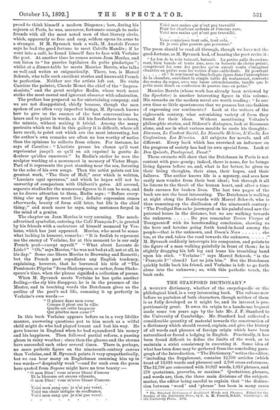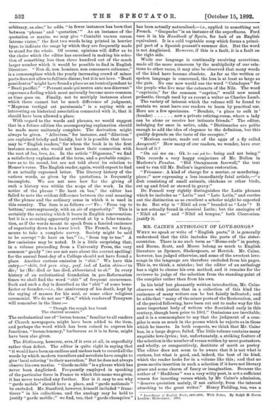THE STANFORD DICTIONARY.*
A MODERN dictionary, whether of the encyclopaedic or the- philological kind, is a very interesting book. The volume now before us partakes of both characters, though neither of them is as folly developed as it might be, and its interest is pro- portionately great. It owes its origin to a handsome bequest made some ten years ago by the late Mr. J. F. Stanford to the University of Cambridge. Mr. Stanford had collected a considerable quantity of material towards the construction of a dictionary which should record, explain, and give the history of all words and phrases of foreign origin which have been naturalised or found a lodging in English. Practically, it has been found difficult to define the limits of the work, or to maintain a strict consistency in executing it. Some idea of what has been done may be gathered from the concluding para- graph of the Introduction. " The Dictionary," writes the editor, "including the Supplement, contains 12,798 articles (which treat of 13,018 words and phrases) and 2,708 cross-references. The 12,798 are concerned with 10,927 words, 1,813 phrases, and 278 quotations, proverbs, or maxims." Quotations, phrases, and words are, then, the three main divisions of the subject- matter, the editor being careful to explain that " the distinc- tion between `word' and 'phrase' has been in many cases
• The Stanford Dictionary of Anglicised Words and Phrases. Edited for the Syndics of the University Press, by C. A. M. Fennell, D.Litt. Cambridge : At the University Press. 1882.
arbitrary, as also," he adds, "in fewer instances has been that between `phrase' and quotation." As an instance of the quotation or maxim, we may give " Cantabit vacnus coram latrone viator," the first two words being printed in heavier type, to indicate the usage by which they are frequently made to stand for the whole. Of course, opinions will differ as to the choice which the editor has exercised in making his selec- tion of something less than three hundred out of the much larger number which it would be possible to find in English literature. " Non di, non homines, non concessere coltimme," is a commonplace which the yearly increasing crowd of minor poets does not allow to fall into disuse; but it is not here. "Beati possidentes" might have found a place as an ironicalpendant to " Beati pacifici." " Pereant male qui nostra ante nos dixerunt" expresses a feeling which must naturally become more common as time goes on. Finally, not to multiply instances about which there cannot but be much difference of judgment, "Magnum vectigal eat parsimonia " is a saying with so interesting an historical association connected with it, that it should have been allowed a place.
With regard to the words and phrases, we would suggest that in a future edition the accompanying explanation should be made more uniformly complete. The derivation might always be given. " Alluvium," for instance, and " diluvium " are explained briefly and lucidly, bat it is possible that there may be "English readers," for whom the book is in the first instance meant, who would not know their connection with the root of luo, lavo, &c. In the article " Diga.mma," we find a satisfactory explanation of the term, and a probable conjec- ture as to its sound, but are not told about its relation to Homer's verse. The English reader, again, would expect to find it an actually expressed letter. The literary history of the various words, as given by the quotations, is frequently incomplete. We are not sure how far the giving of such a history was within the scope of the work. In the notice of the phrase " De haut en bas," the editor has failed to note the evident difference between the real meaning of the phrase and the ordinary sense in which it is used in this country. The item is as follows :—" Fr. : From top to bottom,' contemptuously, with an air of superiority." This is certainly the meaning which it bears in English conversation, but it is a meaning apparently arrived at by a false transla- tion, as if the words meant to speak from a fancied eminence of superiority down to a lower level. The French, we fancy, means to take a complete survey. Society might be said to be corrupt " de haut en bas," i.e., " from top to toe." A few omissions may be noted. It is a little surprising that, in a volume proceeding from a University Press, the very common" gaudy" (we are not sure about the correct spelling) for the annual feast-day of a College should not have found a place. Another curious omission is "obit." We have this entry,—" obiit, 3rd pers. sing., perf. ind. of Latin obire= to die ;' he (He) died or has died, abbreviated to ob." In every history of an ecclesiastical foundation in pre-Reformation times we shall find the word "obit" of frequent occurrence. Such and such a day is described as the " obit " of some bene- factor or founder,—i.e., the anniversary of his death, kept by the saying of masses for his soul, or some other religious ceremonial. We do not see " Kex," which readers of Tennyson will remember in the lines :-
"Though the rough kex break The starred mosaics."
The ecclesiastical use of "locum tenens," familiar to all readers of Church newspapers, might have been added to the item, and perhaps the word which has been coined to express his functions, " locum-tenency," barbarous as it is in form, might have been also given.
The Dictionary, however, errs, if it errs at all, in superfluity rather than defect. The editor is quite right in saying that " it would have been an endless and useless task to record all the words by which modern travellers and novelists have sought to give local coloring' to their narration." But he does not always observe his own maxim. " Garde mobile " is a phrase which has never been Anglicised. Frequently employed in speaking of the particular force in France to which this name was given, it has never travelled any further. Nor is it easy to see why " garde mobile" should have a place, and " garde nationale " be excluded. Mr. Stanford, however, himself included " franc- tireur " in his collections, and the analogy may be held to justify " garde mobile ;" we find, too, that " garde champetre " has been actually naturalised,—i.e., applied to something not French. " Grazpacho" is an instance of the superfluous. Ford uses it in his Handbook of Spain, for lack of an English equivalent. It is a cold vegetable soup which forms a princi- pal part of a Spanish peasant's summer diet. But the word is not Anglicised. However, if this is a fault, it is a fault on the right side.
While our language is continually receiving accretions, made all the more numerous by the multiplicity of our rela- tions to other races, it may also be observed that many words of the kind have become obsolete. As far as the written or spoken language is concerned, the loss is at least as large as the gain. No one now would use the word " Catadupes " for the people who live near the cataracts of the Nile. The word "capriccio," for the common "caprice," would now sound pedantic, though used by as recent a writer as Charles Lamb.
The variety of interest which the volume will be found to contain we must leave our readers to learn by practical use. Here are a few specimens. " Boudoir, a place to sulk in' (bonder) now a private retiring-room, where a lady can be alone or receive her intimate friends." The editor, indulging for once in satire, adds, " Dictionaries are polite enough to add the idea of elegance to the definition, but this quality depends on the taste of the occupier."
" Mexican caviare, made out of the eggs of a fly called Azayacatl." How many of our readers, we wonder, have ever heard of it ?
" On cai me on : Gk. by re.eci Fti to: being and not being." This records a very happy conjecture of Mr. Bullen in Marlowe's Faustus. "Bid Oncaymon farewell," the text used to run till Mr. Basil's ingenious restoration.
" Fricassee : A kind of charge for a mortar, or murdering- piece ;" now expressing a less immediately fatal article,—" a dish consisting of small animals, chickens or other birds, cut up and fried or stewed in gravy."
Dr. Fennell very rightly distinguishes the Latin phrases which he includes as " Latin " and " Late Latin," and carries out the distinction as so excellent a scholar might be expected to do. But why is " Nilail ad rem" branded as " Late"? It is not actually found in classical Latin ; but the analogies of " Nihil ad me" and " Nihil ad tempus," both Ciceronian, justify it.



































 Previous page
Previous page